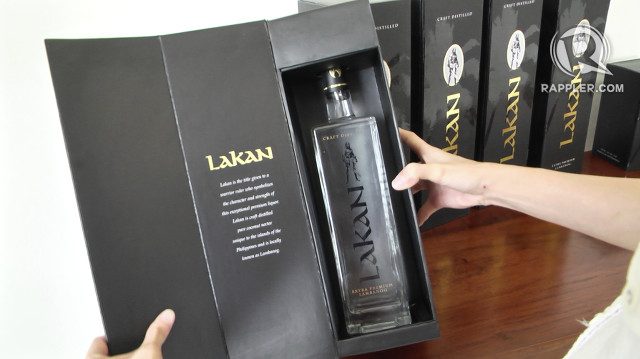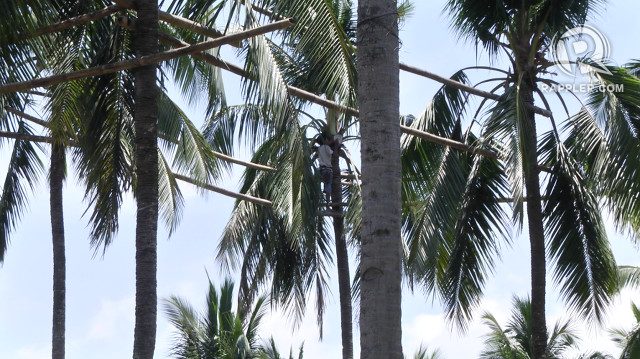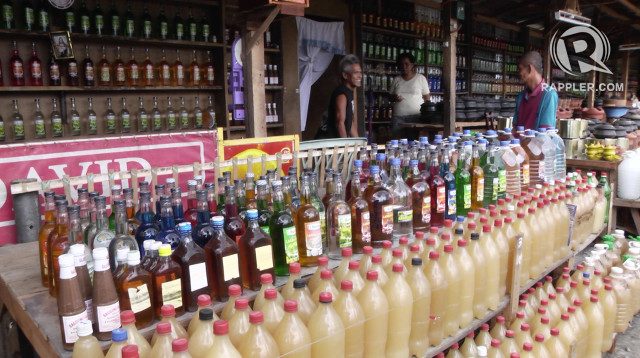SUMMARY
This is AI generated summarization, which may have errors. For context, always refer to the full article.

BATANGAS, Philippines – A sip of award-winning Lakan lambanog begins with a warm caress to both sides of the tongue. The warmth unravels down your throat like a ribbon before flowering in your stomach.
Lakan Extra Premium Lambanog is a 90-proof liquor that goes down very smoothly.
Its great taste was just recently affirmed by the prestigious European quality institute Monde Selection, which awarded Lakan a gold medal for quality in early April.
This medal, the highest award given to a lambanog brand so far, puts the unique spirit among the top liquors of the world.

Lakan, with its promise to live up to “The True Filipino Spirit,” began with a Filipino.
Tony Manguiat, chief executive officer of of Philippine Craft Distillers Incorporated (PCDI), the company behind Lakan, credits Lakan’s potent but silky-smooth formulation to coconut farmer and businessman Lawrence Lim.
Four years ago, Lim handed him a bottle of what would one day be Lakan.
“Lawrence has been developing his lambanog for the last 10 years, so after I met Lawrence, we talked about lambanog and where we can bring it. That’s when we decided to form Philippine Craft Distillers in order to carry and to introduce to the world, lambanog,” Manguiat told Rappler.
We have Filipino products that are world-class. It’s just a matter of us introducing them to the whole world.
– Tony Manguiat, CEO, Philippine Craft Distillers Inc
Lim, a spindly 67-year-old, is also responsible for other lambanog formulations, but it’s only Lakan that can claim the label “extra premium.”
Lakan is tuba or coconut nectar distilled 4 to 6 times, unlike other lambanog in which tuba is typically distilled 1 to 3 times, Lim told Rappler.
Distillation, a process of boiling at specific temperatures in order to extract undesirable substances from a solution, is supposed to take out the “bad alcohol” from coconut nectar.
Not all alcohol are created equal in the tongues of a discerning liquor drinker. Methanol, for instance, is poisonous. Ethanol, the “good” type of alcohol, is what you would find in liquor.
The more you distill tuba, the less bad alcohol in the liquor, the smoother it tastes, and the less disruptive your hangover the next morning.
The mangangarit
While Lakan is making waves in the high-end market, it’s also creating ripples in the coconut-planting villages of Batangas and Quezon.
“The coconut farmers are the foundation of Lakan. Without them, we would have nothing,” said Lim in a thatched hut surrounded by 2,000 coconut trees in San Juan, Batangas.

A few meters away, a mangangarit – a coconut farmer who extracts coconut nectar from the coconut bud – traverses a bamboo bridge, knife in belt.
The coconut farmers are the foundation of Lakan. Without them, we would have nothing.
– Lawrence Lim, Philippine Craft Distillers Incorporated
He is around 20 feet from the ground as he crosses the bridge to get from tree to tree. Once he reaches the part of the tree from where the fronds fan out, he wounds the base – the unopened coconut flower or puso ng niyog. He then places an empty one-gallon plastic bottle over the wound.
The next day, he will climb back up and collect the coconut nectar or tuba that will have dripped into the bottle.
Tuba, when newly extracted, is a milk-white, frothy substance. Lakan and other lambanog brands collect the tuba for distillation.
Ricardo Robiales, a 41-year-old mangangarit, credits the lambanog industry for his improved income.
Three hours spent collecting tuba from his 130 trees earns him P500 a day, far from his daily earnings of only P100 to P150 when he was still a copra farmer.
Copra is aged coconut meat from which coconut oil is extracted. Its trade has dominated the Philippine coconut industry and is blamed for the high poverty levels among coconut farmers.
Robiales said his income has allowed him to send his 4 kids to school.
“Malaking kaibahan. Siyempre binata ka pa nun eh. Siyempre may pamilya na ngayon, eh di iba na ngayon. Kaya sa pangangarit, aming sinisipagan para malaki ang aming income na pera.“
(There’s a big difference. I was just single then. Now I have a family. That’s why in harvesting coconut nectar, we work hard so we get a big income.)
Improving the income of other coconut farmers like Robiales is critical. The country’s 3.5 million coconut farmers are the “poorest of the poor,” according to the National Anti-Poverty Commission (NAPC).
Around 41% of coconut farmers live below the poverty line, almost double the national average of 25%.
The average coconut farming household earns a meager P16,000 ($355) a year. If the farmer is a copra farmer, he earns even less – P10,000 ($222) a year.
Lim said Lakan’s operations are able to pay farmers for tuba 10 times more than what they would get if they were still farming copra.
“If they used to earn P30,000 per hectare per year, now they can earn up to P300,000 per hectare per year,” he said.
Saving our coconuts
The tuba collected by people like Robiales are today enjoyed by tourists and executives who have discovered Lakan.
Manguiat said Lakan has been receiving much support from government agencies, like the Department of Tourism, the Department of Trade and Industry, and the Department of Agriculture.
It’s in everyone’s best interest to uplift the lambanog industry, he said.
“We want lambanog to be recognized as a special spirit category in the world. Brazil has cachaça, Mexico has tequila, Europe has vodka. The Philippines has lambanog. We have Filipino products that are world-class. It’s just a matter of us introducing them to the whole world,” he said.

With lambanog more readily accepted by the world’s drinkers, the more investments will go to the lambanog industry.
Tito Osias, a partner at PCDI, thinks, if done right, lambanog alone can become a $1-billion industry, effectively doubling the country’s earnings from the entire coconut industry.
The time has never been ripe as the world raves about coconuts as the latest “superfood.” Lambanog alone can boast of being “all natural” because it requires no additives, preservatives, or fermentation aids.
The coconut industry needs all the help it can get.
Of the country’s 340 million coconut trees, around 40% are considered old or senile. Some 30 million were lost to Super Typhoon Yolanda (international name Haiyan), another 3 million were damaged by the recent coconut pest infestation.
An ailing coconut industry ultimately affects the lives of 25 million Filipinos dependent on the sector.
Lakan, named after a pre-colonial warrior class, is just one fighter in a larger battle. – Rappler.com
Add a comment
How does this make you feel?
There are no comments yet. Add your comment to start the conversation.